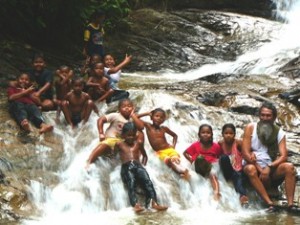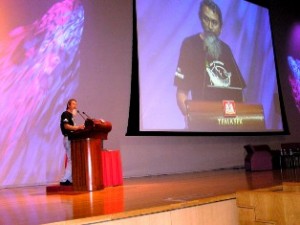Green activist
Protecting the environment – one man’s sacred cause.
BY: Eleanor Yap
 He is a “25-year-old man trapped in a 61-year-old’s body” according to his wife, and he is passionate about green causes. Some would call that a powerfull mix but for Grant W Pereira, he is just doing what comes naturally. His 36-year-old daughter Deidre follows in his footsteps as an environmentalist and with her ove for animals.
He is a “25-year-old man trapped in a 61-year-old’s body” according to his wife, and he is passionate about green causes. Some would call that a powerfull mix but for Grant W Pereira, he is just doing what comes naturally. His 36-year-old daughter Deidre follows in his footsteps as an environmentalist and with her ove for animals.
SALT Online chats with Pereira about fighting for the environment and what keeps him doing the work he does:
I understand you were a writer and joined Greenpeace in Europe more than 24 years ago, a decision which got you involved in the green cause. What incident spurred you on initially? How was the first experience?
I was always aware of social issues but while in Europe, I was influenced by a girlfriend who was heavily involved in both social and animal rights issues. Greenpeace was initially called “Make a Wave Foundation” and our first protests were against the French Government’s nuclear testing at Murorau Atoll in the Pacific Islands. They lied to the islanders saying that their above-ground testing was harmless and kept them in zinc huts while the tests were being carried out. We argued that if it was harmless then the French should carry out their experiments in France itself.
 I understand you run The Green Volunteers and you are on the board of advisors of the Sea Shepherd Conservation Society based in the US. What are you doing for these organisations? Are there any other organisations that you are involved with?
I understand you run The Green Volunteers and you are on the board of advisors of the Sea Shepherd Conservation Society based in the US. What are you doing for these organisations? Are there any other organisations that you are involved with?
The Green Volunteers are an independent green group and are probably the most active “hands-on” green group around. You can check our blog at www.thegreenvolunteers.blogspot.com. We do conservation projects such as a hornbill breeding project in south Johor, we give school talks and camps, and we do service learning trips (taking students overseas to do social and environmental projects) to Malaysia, Indonesia and Thailand. We have adopted a number of schools where we help with stationery, medicines, games, etc.
We have a project in Jakarta where we help a trash picker community by recycling trash into useful items like bags, pencil cases, computer bags, etc. These are sold in Singapore and the proceeds are sent back to Jakarta to run a soup kitchen for underprivileged children and women. The long-term plan is to build a school for all the children.
My main project for Sea Shepherd Conservation Society is handling education and awareness on the rapidly diminishing shark population and other endangered animals like the orangutans in Indonesia and elephants in Thailand and Indonesia.
What are some of your biggest pet peeves about the environment and conservation fields?
I have many pet peeves – the number one being plastic bags given out free of charge at shopping centres here in Singapore. If countries like Taiwan, Bangladesh, Australia or even Somalia can ban or charge for plastic bags, I don’t see why there is such a lack of political will in Singapore. Is it that Singapore is a main refining centre and we are pandering to the whims of these oil giants?
We should charge for plastic bags and the money collected can go to our Garden City Fund to plant new saplings and plants to make Singapore not only cleaner and greener but also help slow down global warming and climate change in the world. Singaporeans also have to play their part in reducing the use of plastic bags.
With a population of six million, if we use one plastic bag a month we reduce plastic bag usage by 72,000,000 a year. If we reduce by one bag a week that is 288,000,000 a year … that’s a lot of bags. The Government should seriously address this pressing problem, bite the bullet and first charge for plastic bags than later ban them all together.
Littering is still a major problem even though the Clean and Green Campaign was launched in 1968, some 42 years ago. If you go to our parks on a Monday morning, you’ll be appalled at the amount of trash lying around even though trash bins are nearby. Even today we clear about 140,000 tonnes of rubbish from our drains each year. Has our Clean and Green message fallen on deaf ears all this time?
I am a strong supporter of harsher penalties and higher fines, especially for repeat offenders. I do the anti-sharks fin campaign through Sea Shepherd Conservation Society. More and more companies and hotels are taking sharks fin off their menus. It is a start but it might be too late as between 75 to 100 million sharks are killed a year just for their fins … this cannot go on!
 In dealing with environmental and conservation issues, what is the best educational approach?
In dealing with environmental and conservation issues, what is the best educational approach?
I strongly believe in education and the young are our best hope. I believe that you cannot teach old dogs new tricks. Parents teach their children many things but when it comes to conservation and environmental issues, I believe children will teach their elders.
I believe that environmental education should be a compulsory subject in school and held as the last subject on a Friday so that children can practice what they learnt over the weekend. This could even develop into a school project and made into a book.
What do you hope to achieve through your work in say the next five years?
The conservation fight is a long and uphill battle. It will be won by small battles. You only lose when you give up … so stay on the wheel. I don’t know what I will be doing for the next five years but God willing I’ll be doing this till I cannot do it anymore.
Could you share an unforgettable moment in your work?
There have been a number of memorable events in my life but one was snorkelling with whale sharks in Donsol, Philippines and the other was a reforestation project I did in northern Thailand. It was a great feeling seeing a barren piece of land totally transformed into a lush new forest.
But the most unforgettable experience for me was seeing a baby elephant being born. Elephants usually give birth in the very early hours of the morning when nobody’s around. If you are lucky you get to see this wonderful sight. As soon as the baby is born it is surrounded by its “aunties” who show such great affection. It is a very touching and moving sight. There’s so much love and care that is shown to the newborn. It’s very different from us humans, who sometimes abandon our young.
There are some very verbose people in the environment and conservation scene. Ric O’Barry of Save Japan Dolphins comes to mind when thinking about how far he goes to get the issues addressed. How do you compare yourself in terms of approaches?
I come from an old school that believes “that a cat may look at a king”. There are no scared cows. Everyone is fully responsible for his or her actions and there is no passing the buck.
I am a direct person – many would say blunt. If I am not happy about something I will speak out; I don’t worry about speaking truth to power so I don’t get invited to politically-correct Government functions but that’s ok. I say what needs to be said.
What does a regular day for you involve?
I now work for a travel company organising eco and edu trips for schools and companies. My boss is very supportive of my other work and gives me much leeway. My days are long, usually 15 hour work days. It’s tiring but I enjoy doing it and will continue doing it for as long as I can.
Why is doing this work so important to you?
The earth is our home and we need to take care of it. I do this work because I want to, not because I have to. It came to me naturally and I will continue with this till I physically or mentally cannot do it any more.
Anything you would like to add?
I would like to see more young people get involved in the green movement and not just for points for a project or trying to create a “green” portfolio for their resume. Do it as a sacred cause; walk the walk not just talk the talk.
** The story above has been reprinted with permission from SALT Online, part of the National Volunteer & Philanthropy Centre.

0 Comments